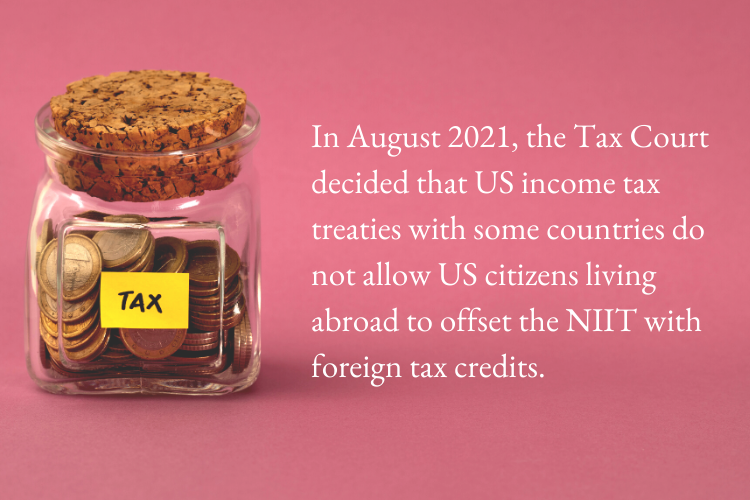Tax Court Rules Foreign Tax Credit Cannot Offset NIIT

written by Gina Lee, Senior Associate at CK Tax Services LLC
Net Investment Income Tax (“NIIT”) went into effect on January 1, 2013. NIIT is a 3.8% tax on investment income such as capital gains, dividends, and rental property income, imposed on a portion of your modified adjusted gross income (MAGI) over certain thresholds. NIIT is an additional tax that only applies to high-income taxpayers ($125,000 for filers married filing separately, $250,000 for married couples filing jointly, $200,000 for single and head of household filers, as well as certain estates and trusts).
The purpose of the NIIT is that individuals with high-income levels earning income from nonwage sources should contribute more to the expanded health care program (the universal health coverage system under the Affordable Care Act or Obamacare, which became effective in 2010) in a similar manner as high-earning individuals being subject to higher withholding tax on their wages. The official name of the NIIT is the “Unearned Income Medicare Contribution Tax.” Essentially, the NIIT is designed to raise revenue to cover the cost of expanded Medicare coverage.
The NIIT could be a significant additional US tax to a US citizen living abroad. The question is whether the NIIT is a Medicare tax, subject to an exemption under a totalization agreement (i.e., Social Security Agreement), or an income tax, against which foreign tax credits can be applied.
The issue is that the NIIT was passed under a new chapter of the US tax code making it unclear (a) whether totalization agreements exempt the NIIT and (b) whether it is an income tax eligible to be offset by foreign tax credits since the US tax code allows foreign tax credits to be applied only against taxes imposed under Chapter 1 and the NIIT was enacted under a new chapter, Chapter 2A. The IRS has provided guidance that the NIIT is a tax that is not subject to offset by the foreign tax credit. It is noteworthy that the NIIT is added to an individual’s income tax return on a line after the foreign tax credit is entered, implying that the NIIT is not subject to offset by the foreign tax credit. As with many laws that affect US citizens living abroad, Congress simply did not contemplate the effect of the NIIT on the US taxpayers overseas.
In August 2021, the Tax Court decided Catherine S. Toulouse v. Commissioner, holding that US income tax treaties with some countries do not allow US citizens living abroad to offset the NIIT with foreign tax credits. The Tax Court ruling was based on the strict interpretation of the words in the US tax code and regulations: that (1) the IRC Sections 27 and 901 governing foreign tax credit provide that the foreign tax credit is allowed to reduce only the tax imposed under Chapter 1 and the IRC Section 1411 governing NIIT is found in Chapter 2A; and (2) Treas. Reg. Section 1.1411-1(e) specifically addresses this issue and explains that the IRC does not provide a foreign tax credit against the NIIT.
The Court considered the plain meaning of the income tax treaties and found that the foreign tax credit is allowed only in accordance with the IRC. Since the IRC does not allow a foreign tax credit against the NIIT, income tax treaties could not be used to offset the NIIT with foreign tax credits. The Court also rejected the taxpayer’s contention that the treaties are generally intended to protect against double taxation, noting that such protection is not absolute.
In addition, the Court noted that Congress created Chapter 2A when it enacted the NIIT, and IRC Section 1411 is the only section of the chapter, from which the Court found that the place of Section 1411 in a newly created chapter clearly showed the intent to impose a distinct and separate tax.
Unfortunately, for US citizens and residents living outside the US, they will not be able to rely on income tax treaties to offset the NIIT. It is unlikely the drafters of the law considered the implication of putting a new tax in a separate chapter of the Code. But given the location of IRC Section 1411 in a new chapter, coupled with limiting the IRS to only drafting regulations using IRC Section 7805 interpretative authority (as opposed to granting them legislative regulation-writing authority), the hands of the IRS were figuratively tied with regards to overruling the express language in IRC Sections 27 and 901 and the treaties at issue.
Treasury Department had the opportunity to modify the 2016 U.S. Model Income Tax Treaty to address the NIIT, but it chose not to. Even so, a modification in 2016 would not have helped Toulouse because it could have only covered newly enacted treaties. The IRC Section 27 limiting language in the model treaty explanation that was also found in the US-France Income Tax Treaty at issue in Toulouse is found in most US treaties enacted over the last generation or two. So, it is likely that taxpayers taking the same position as Toulouse under treaties similar to the US-France Income Tax Treaty will likely meet the same fate.
Exemption from the NIIT under totalization agreements is still viable. Treasury’s Green Book released in May 2021 includes a proposal to “Rationalize Net Investment Income and Self Employment Contributions Act (SECA) Taxes.” Currently, the NIIT does not apply to self-employment earnings and S corporation shareholders, and proceeds from the NIIT flow into the General Fund of the Treasury. As part of that proposal, the Biden Administration recommended that self-employment income and nonwage distributions to S corporation shareholders be subject to the NIIT, if not otherwise subject to SECA tax, and that all of the revenue from the NIIT (raised under current law and to be raised by the proposed expansion) be redirected to the Hospital Insurance Trust Fund, just as is revenue from the regular 3.8% Medicare tax under FICA and SECA.
This proposal is actually beneficial to U.S. taxpayers overseas, where the NIIT seems to be designed as a social insurance-type tax and thus would presumably be covered by Totalization Agreements. Presumably, this change would also come with language similar to that in the self-employment-tax regime found in IRC Section 1401(c), which provides that an agreement entered into pursuant to section 233 of the Social Security Act with any foreign country can be used to exempt an individual from being subject to self-employment tax of the U.S. to the extent that such self-employment income is subject to the tax of the social security system of such foreign country.
Although fewer countries are covered by totalization agreements than by income tax treaties, at this time, this might be the only viable option to remedy the NIIT result in this case for US citizens or residents living outside the US.
__________________________________________________
Gina Jeyoung Lee is a senior associate at CK Tax. Gina is involved in individual and business tax planning and compliance, as well as domestic and international estate planning. Gina’s experience includes preparing and reviewing individual and business tax filings, preparing tax planning memoranda, and drafting estate planning documents.
« Tax Update: IRS to Stop Certain Automated Notices IRS Proposed Limits to Certain Gift’s Preferential Treatment Under the Tax Cuts and Jobs Act »
